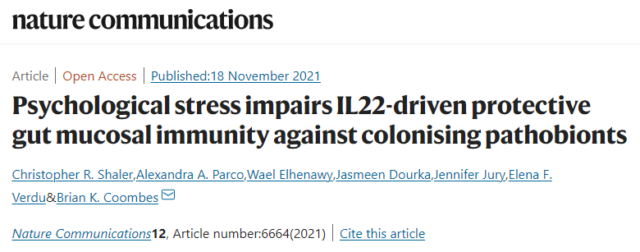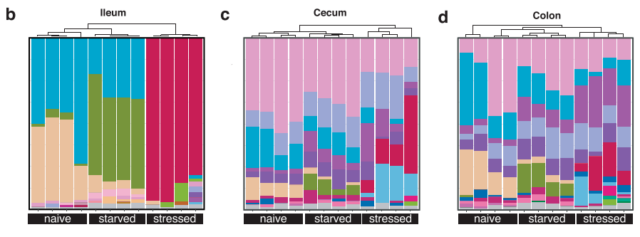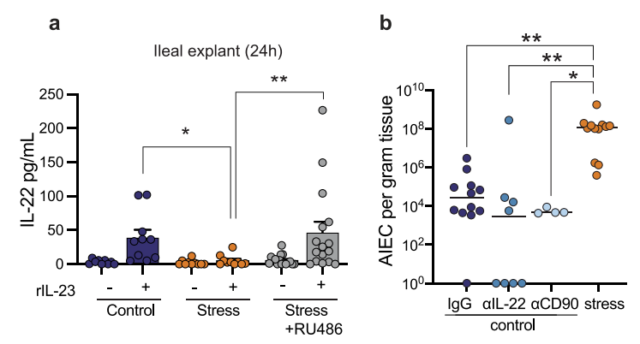Stress damages intestinal barrier and make harmful bacteria to multiply
- Normal Liver Cells Found to Promote Cancer Metastasis to the Liver
- Nearly 80% Complete Remission: Breakthrough in ADC Anti-Tumor Treatment
- Vaccination Against Common Diseases May Prevent Dementia!
- New Alzheimer’s Disease (AD) Diagnosis and Staging Criteria
- Breakthrough in Alzheimer’s Disease: New Nasal Spray Halts Cognitive Decline by Targeting Toxic Protein
- Can the Tap Water at the Paris Olympics be Drunk Directly?
Stress damages intestinal barrier and make harmful bacteria to multiply
- Should China be held legally responsible for the US’s $18 trillion COVID losses?
- CT Radiation Exposure Linked to Blood Cancer in Children and Adolescents
- FDA has mandated a top-level black box warning for all marketed CAR-T therapies
- Can people with high blood pressure eat peanuts?
- What is the difference between dopamine and dobutamine?
- How long can the patient live after heart stent surgery?
Stress damages intestinal barrier and make harmful bacteria to multiply.
Nature Sub-Journal: High pressure, easy to diarrhea! Stress can damage the intestinal barrier, allowing harmful bacteria to multiply.
With the acceleration of the pace of life, people’s life pressure is becoming more and more serious. Early studies have shown that stress can cause hair loss, gray hair, obesity, and other hazards.
Long-term and uncontrolled stress can lead to a range of health problems, including heart disease, diabetes, depression, and anxiety.
With the acceleration of the pace of life, people’s life pressure is becoming more and more serious.
Early studies have shown that stress can cause hair loss, gray hair, obesity, and other hazards. Long-term and uncontrolled stress can lead to a range of health problems, including heart disease, diabetes, depression, and anxiety.
Not only that, but stress can also inhibit immune function, weaken resistance, and even promote tumor growth.
Crohn’s disease (CD) is an inflammatory disease of the gastrointestinal tract caused by microorganisms and environmental damage. In recent years, the global burden of disease related to Crohn’s disease is increasing, especially in developed countries with an increasing incidence.
The condition is prone to recurrence, and it is not easy to cure, and there is no cure.
November 18, 2021, Researchers from Canada’s McMaster University published a research paper entitled” Psychological stress impairs IL22-driven protective gut mucosal immunity against colonising pathobionts ” in Nature sub-Journal ” Nature Communications”
The study showed that stress hormones inhibit the body’s ability to resist intestinal bacteria that may be related to Crohn’s disease, causing harmful microorganisms to invade the intestines and trigger the onset of symptoms .

The key to innate immunity is the protective barrier of intestinal epithelial cells, which relies on immune cells to prevent harmful microorganisms, repair cell walls and secrete mucus. If immune cells function abnormally, the epithelial cell wall will break down, allowing microorganisms related to Crohn’s disease to invade the intestines and trigger the onset of symptoms.
In order to study the impact of stress on the microbiome, researchers developed a preclinical model of acute psychological stress and conducted experiments in mice. After the pressure was released, the microbiome in the ileum, cecum, and colon was analyzed by rRNA sequencing and compared with the control group.
The study found that in mice after stress exposure, Enterobacteriaceae accounted for the largest proportion of all intestinal microbiota in the gut, and it was the most obvious in the ileum, accounting for more than 80% . Compared with unstressed control mice, their abundances were all less than 1%.

Stress leads to enrichment of Enterobacteriaceae in the ileum
In addition, the pressure group also showed enrichment of Enterococcus, Proteus and Myxospore bacteria, but not in the control group. Its gut microbial characteristics are consistent with those of Crohn’s disease patients and spontaneous ileitis mice.
In a typical mouse model of Crohn’s disease or colitis, the less abundant bacteria include Lactobacillus, Bifidobacterium, Faebacterium and Murine bacteria, and these groups are also reduced in stress-stressed mice.
In addition, in mice exposed to psychological stress, the bacterial diversity in the ileum was significantly reduced .
These data indicate that pressure stress can lead to drastic changes in the gut microbial population, with the largest change in Enterobacteriaceae .
Then, the researchers colonized E. coli into a mouse model. The study found that pressure-induced glucocorticoids promote the apoptosis of IL-22 -producing cells , which is a cytokine necessary to maintain the integrity of the ileal mucosal barrier.

Stress-induced glucocorticoid promotes IL-22-producing cell apoptosis
Importantly, the researchers also found that blocking glucocorticoid signals or giving recombinant IL-22 can restore mucosal immunity , prevent ileal flora from dysregulation, and prevent the expansion of E. coli.
In summary, the study concluded that stress will damage the protective immunity of the integrity of the intestinal barrier, thereby creating favorable conditions for the expansion of Crohn’s disease-related pathogenic bacteria. Importantly, research also shows that immune regulation can counteract the negative effects of stress on intestinal immunity.
Researchers said that this discovery may bring new treatments for Crohn’s disease, but these findings are still in the preclinical stage and more work needs to be done.
Paper link:
https://doi.org/10.1038/s41467-021-26992-4
Stress damages intestinal barrier and make harmful bacteria to multiply
(source:internet, reference only)
Disclaimer of medicaltrend.org
Important Note: The information provided is for informational purposes only and should not be considered as medical advice.



